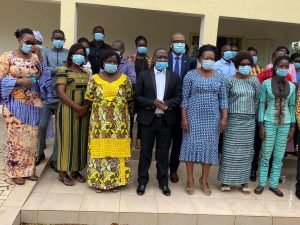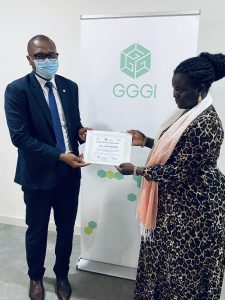Koubri, August 11-13, 2020 – The Global Green Growth Institute (GGGI) in partnership with the Ministry of Environment, Green Economy and Climate Change of Burkina Faso and NDC Partnership conducted the first training session of a 3-day workshop on Gender mainstreaming in NDCs Sectoral Plans under the Climate Action Enhancement Package project.
This first session of the workshop was attended by thirty (30) representatives of NDC sectors from six ministries: Ministry of Environment, Green Economy and Climate Change; Ministry of Agriculture and hydro-agricultural schemes; Ministry of Animal and Fishing Resource; Ministry of Water and Sanitation; Ministry of Transport, Urban Mobility and Road Safety; and Ministry of Women, National Solidarity and Family.

The training aimed to build the capacity of NDC focal points within the ministries on how to mainstream gender in the new NDC revision as well as climate change-related issues. This approach will help:
- harmonize the participants’ understanding of the gender approach;
- raise awareness and inform participants on the link between gender and climate change; and
- enhance their capacity by providing the right tools that will facilitate the gender mainstreaming in NDC Sectoral Plans.
The opening ceremony was led by representatives of the Government of Burkina Faso, NDC Partnership National Facilitator (Athanase Kinda), and GGGI Country Representative (Malle Fofana). In his welcome speech, Dr. Mallé Fofana, GGGI Burkina Faso Country Representative, recalled the main objectives of this Climate Action Enhancement Package Project, among which, providing necessary tools and knowledge allowing the preparation of the country’s next NDC generation, by developing sectorial actions plans with strong gender approach integration and NGO participation.
The training sessions were led by Mr. Tidiani Ouedraogo, the National Gender Consultant of the project. During the session, the following points have been developed and discussed:
- Understanding gender issues;
- Perception and expectations of men and women;
- Roles of men and women, gender relations and lifestyle choices;
- Why mainstream gender in key areas of the NDC;
- Gender Action Plan outline and requirements
The next steps will be focused on:
- Formalizing the current sectoral groups by decree to maintain the momentum;
- Organizing a workshop on climate change, NDC and sectoral plans approach; and
- Developing sectoral plans integrating gender
